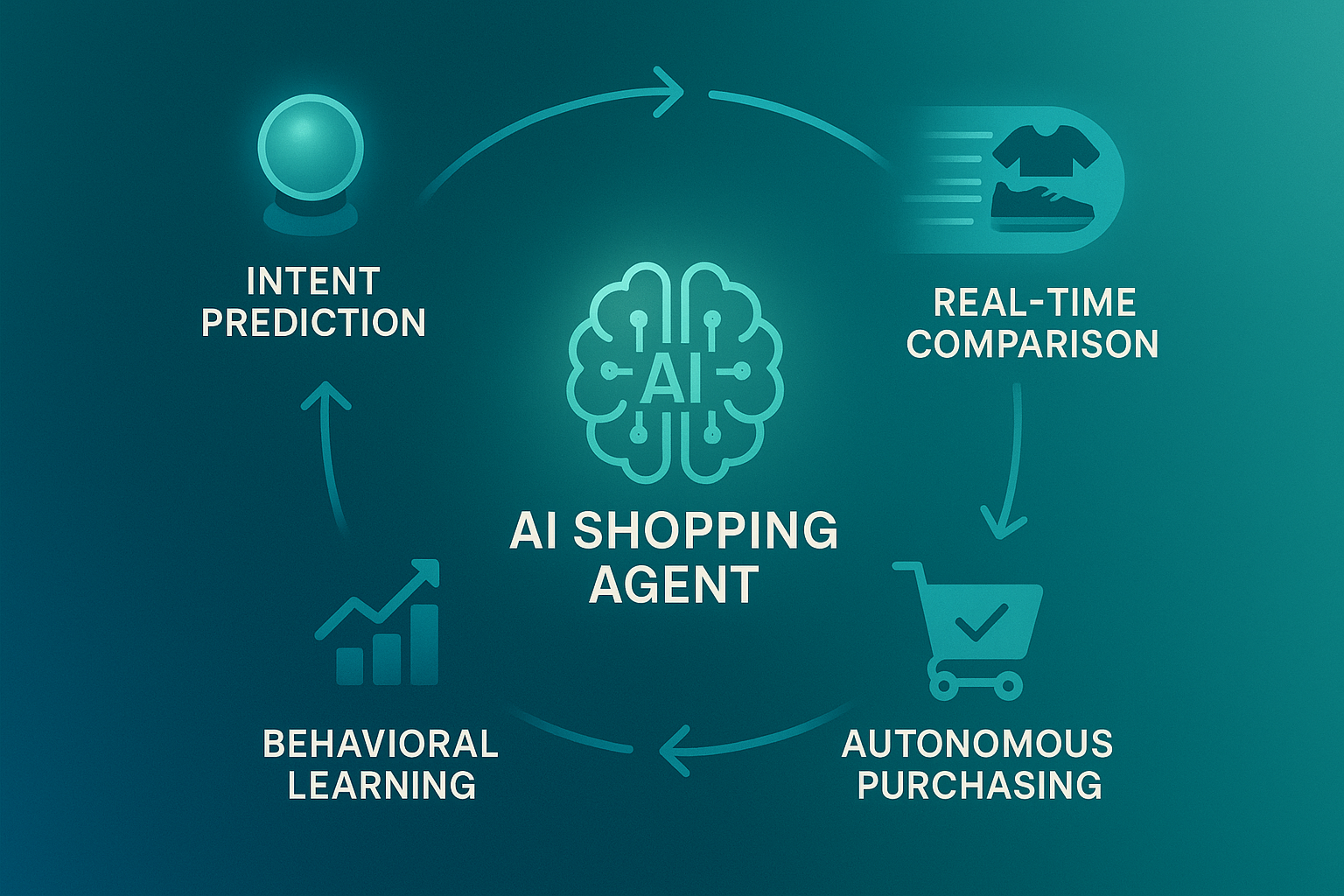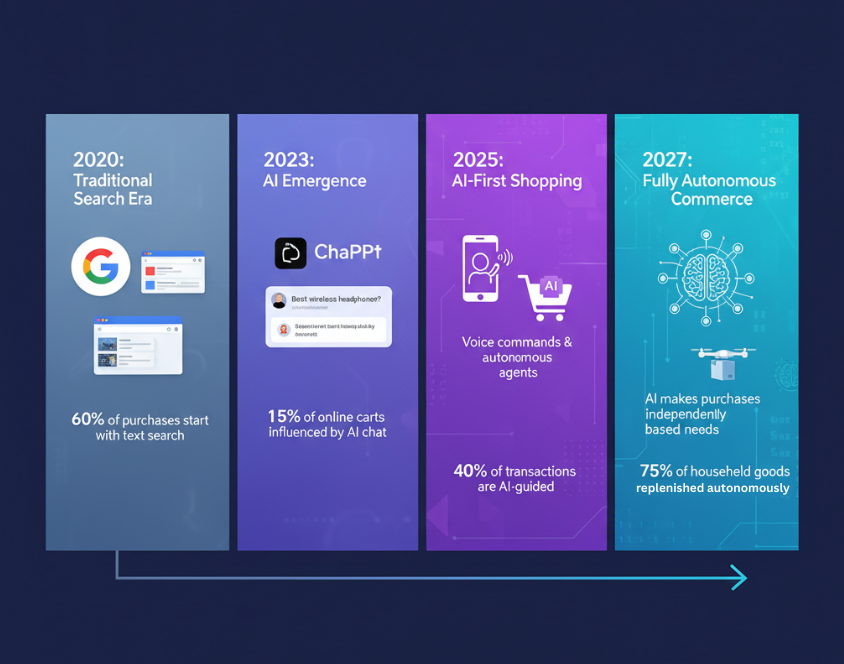How AI Agents Are Reshaping the Shopper Journey
Discover how AI agents are transforming consumer shopping from traditional SEO to Generative Engine Optimization (GEO). Learn the data-driven strategies brands need to stay visible in 2025's AI-powered discovery landscape.
The shopping revolution is here, and it's not happening on traditional search pages. While brands perfected their keyword strategies and link-building campaigns, AI agents quietly rewrote the rules of consumer discovery. Today, 39% of consumers and 54% of Gen Z are already using AI for product discovery, with shopping queries on ChatGPT alone doubling in just six months.
The Death of the Click-and-Browse Era
Here's what the data shows: consumers are abandoning the labor-intensive process of opening multiple tabs, comparing options across sites, and manually sifting through reviews. Instead, they're delegating these tasks to AI agents that can research, compare, and even purchase products on their behalf.
The numbers tell the story:
- 71% of consumers want generative AI integrated into their shopping experiences
- 58% have replaced traditional search engines with AI tools for product recommendations
- AI shopping queries grew 100% from January to June 2025 on ChatGPT alone
- 75% of retailers believe AI agents will be essential for competitive advantage by 2026
Most brands miss this fundamental shift: the customer journey is no longer a funnel you control, it's a compressed process happening inside AI systems where you may never appear unless you're optimized for machine understanding, not human browsing.
Why Traditional SEO Falls Short in the AI Era
Traditional Search Engine Optimization was built for a world of blue links and keyword matching. Generative Engine Optimization (GEO) operates on entirely different principles. While SEO rewards precision and repetition, AI engines prioritize content that's well-organized, contextually rich, and dense with meaning.
The fundamental differences:
- SEO focuses on ranking for keywords; GEO targets showing up for prompts
- SEO optimizes for page visits; GEO optimizes for citations and mentions
- SEO rewards backlink quantity; GEO values authoritative context
- SEO targets human searchers; GEO serves both humans and AI systems
Industry leaders implementing GEO tactics are already charging $4,000+ monthly premiums for these specialized services. Early adopters report 30-40% increases in AI platform visibility, while traditional SEO-only competitors struggle with declining search referrals.
The Rise of Autonomous Shopping Agents
The most dramatic change isn't just how people search—it's who's doing the shopping. AI agents are evolving from simple chatbots to autonomous shopping companions that predict needs, negotiate prices, and complete purchases without human intervention.
Current AI shopping capabilities:
- Intent prediction: Anticipating customer needs before they're explicitly stated
- Real-time comparison: Instantly analyzing prices, reviews, and availability across platforms
- Autonomous purchasing: Completing transactions when preset criteria are met
- Behavioral learning: Adapting recommendations based on past interactions

AI shopping agent capabilities
Amazon's "Buy For Me" feature and Google's agentic checkout demonstrate how major platforms are betting on this shift. When 63% of Gen Z shoppers express interest in AI agents purchasing items on their behalf, we're witnessing the emergence of a fundamentally different commerce model.
The New Competitive Landscape: Brands vs. Platforms vs. AI
With AI agents searching more broadly and comprehensively than humans ever could, the balance of power is shifting away from retailers toward brands and AI platforms. This creates both unprecedented opportunities and existential threats.
The competitive reality is stark:
- First-party data becomes king: Brands with direct customer relationships gain significant advantages in AI personalization
- Traditional loyalty programs lose effectiveness: When AI agents optimize shopping across merchants, brand loyalty becomes algorithmic rather than emotional
- Platform dependency intensifies: Being invisible in AI responses means being invisible to increasingly large segments of consumers
Forward-thinking companies are adapting by building direct relationships with AI platforms, optimizing content for machine comprehension, and developing their own AI-powered customer touchpoints. The brands winning in this environment treat AI systems as distribution channels, not threats.
Implementing Your GEO Strategy: From Theory to Practice
Most agencies treating GEO as an add-on service are missing the strategic transformation required. Successful GEO implementation demands fundamental changes to content strategy, technical infrastructure, and brand positioning.
Essential GEO tactics for 2025:
Content Optimization for AI Systems:
- Structure content with clear hierarchies and scannable evidence
- Lead with direct answers to implied questions
- Use phrases like "in summary" and bullet formatting to help AI extraction
- Create comprehensive, Wikipedia-style coverage of topic areas
Authority Building for Citations:
- Pursue media mentions across trusted publications
- Develop first-party research that establishes expertise
- Secure expert quotes and branded citations in industry content
- Implement schema markup for contextual understanding
Technical Infrastructure Updates:
- Optimize for "speed to first token"—AI systems prioritize fast-loading, immediately useful content
- Ensure crawlability supports quick content fetches
- Implement structured data that AI systems can easily parse
- Create content that serves both traditional search and AI discovery
The key insight: GEO isn't about abandoning SEO, it's about expanding your visibility strategy to capture attention wherever your customers seek trusted information and recommendations.
Measuring Success in the AI-First World
Traditional metrics like click-through rates and time-on-site remain important, but AI optimization requires new performance indicators. Smart brands are tracking AI citation frequency, voice search visibility, and brand mention sentiment across AI platforms.
Industry leaders use tools like BEONAI to monitor their presence across ChatGPT, Claude, Perplexity, and other AI systems, understanding that visibility in AI responses often correlates with traditional search performance while opening entirely new customer acquisition channels.
The convergence is clear: the same tactics that earn media coverage, backlinks, and social engagement also improve your odds in AI summaries and search overviews. Authority, originality, and trust work across all platforms—but only if you build them with both human and machine audiences in mind.

Online shopping evolution
The era of passive brand discovery is ending. In 2025, the brands that thrive will be those that master the convergence of search, social, and AI—treating them not as separate channels but as interconnected systems all optimized by the same core signals of authority and relevance.
Are you tracking your brand's visibility across AI platforms? While most competitors focus solely on traditional search metrics, leading brands are already building comprehensive strategies that capture attention wherever their customers seek information. The question isn't whether AI will reshape your industry—it's whether you'll adapt your visibility strategy before or after your competitors do.
FAQs
What is GEO, and how does it differ from SEO?
GEO targets AI systems for brand mentions, while SEO focuses on search rankings.
Are AI agents actually making purchases for consumers?
Yes, 32% of consumers use AI for shopping, with autonomous purchases growing.
How do I measure GEO performance?
Track AI citations, mentions, voice search visibility, and AI-driven conversions.
Will GEO replace traditional SEO?
No, GEO complements SEO by boosting visibility across AI discovery channels.
What content works best for AI agents?
Structured, scannable, evidence-based content with clear answers and topic coverage.
How quickly should brands adopt GEO strategies?
Early adopters gain 30–40% visibility; delays risk losing market share.
What's the investment required for effective GEO?
Agencies charge $4,000+ monthly, but many tactics fit existing strategies.
Which AI platforms should brands prioritize?
Focus on ChatGPT, Google AI Overviews, Perplexity, and Claude for reach.
